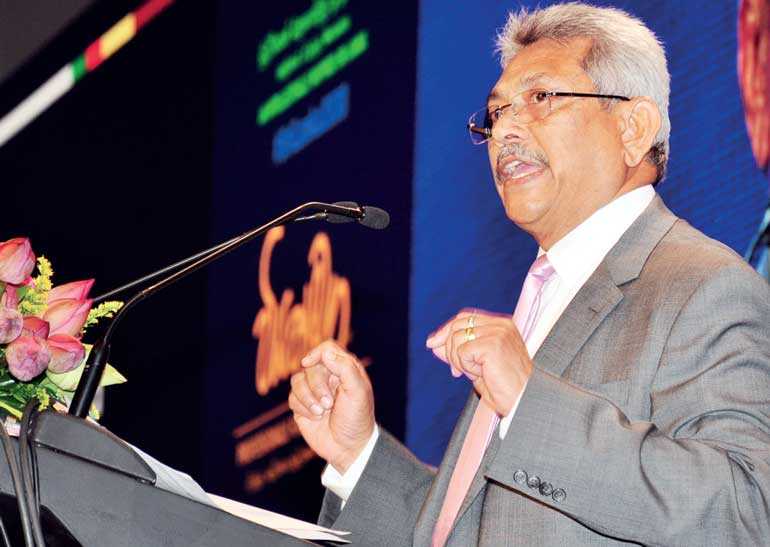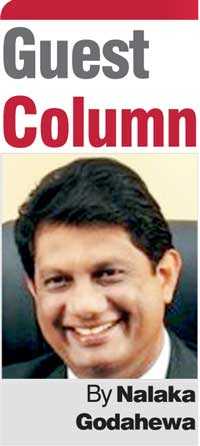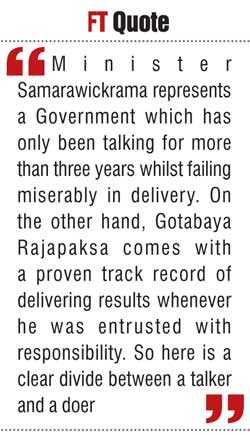Tuesday Feb 17, 2026
Tuesday Feb 17, 2026
Monday, 28 May 2018 00:00 - - {{hitsCtrl.values.hits}}

Viyathmaga Chairman and Former Defence Secretary Gotabaya Rajapaksa
American economist and social theorist Thomas Sowell once said, “The big divide in this country is not between Democrats and Republicans, or men and women, but between talkers and doers.”
When a powerful Minister of the Government gets into a panic and issues a press statement criticising a speech made by an ordinary citizen at a non-political event there is something bizarre about it. That is exactly what Minister Malik Samarawickrama did a few days ago. When we see his statement challenging the economic views expressed by the Gotabaya Rajapaksa in his capacity as the Chairman of Viyathmaga at the recently concluded Annual Convention 2018, invariably the above quote by Thomas Sowell comes to our minds.
Minister Samarawickrama represents a Government which has only been talking for more than three years whilst failing miserably in delivery. On the other hand, Gotabaya Rajapaksa comes with a proven track record of delivering results whenever he was entrusted with responsibility. So here is a clear divide between a talker and a doer.

It is no secret that the economy of this country is sliding downhill. During the last three years of the previous Government, the average growth rate of the economy was closer to 7%. In 2015 under the new Government it dropped to 5%. In 2016 it was down to 4.5%. By 2017 it had further slipped to 3.1%. Though the current Government came to power promising one million new jobs, the reality is that the 8.4 million jobs that were available in 2014 had come down to 8.2 million by the end of 2017.
The stock market has lost Rs. 215 billion in market capitalisation over the last three years. Since January 2015, the rupee has devalued by about 19% and foreign debt commitments have increased by Rs. 886 billion as a result. The unsettled national debt has gone up from Rs. 7,391 billion to Rs. 10,400 billion by 2017, a 40% increase in just three years.
Meanwhile, the tax burden had gone up by 60% compared to 2014. In 2017 the Government collected Rs. 620 billion in taxes more than in 2014. In 2018 the Government is expected to collect one trillion in taxes more than in 2014, which will be a 100% increase. Despite these huge tax increases, the benefits to people have not increased. No new roads, no new hospitals or no new schools have come up. Though there was a promise to allocate 6% of GDP for education and 3% for health during election campaigning, the real allocations still remain at 1.9% and 1.5% respectively.
Whilst the economy is struggling, the current Government has presented nine different economic policy statements during its first 36 months in office and apparently the 10th is also on the way. Accordingly, no one knows which policy document they intend to implement if and when they wake up from the deep slumber they seem to currently be in.
Social and socialist
In a press statement where he has taken great pain to scrutinise the speech delivered by the Chairman of Viyathmaga, the Minister claims that Gotabaya Rajapaksa had borrowed the idea of a ’social market economy’ from the UNP’s election manifestos. The Minister should consult a doctor as early as possible because he could be suffering from a serious hearing problem. On the other hand it could also be his genuine lack of understanding of modern economic theories. Gotabaya Rajapaksa never spoke of a ‘social market economy’ at the Viyathmaga convention. He was referring to an economic model called ‘the socialist market economy’. This is an economic system and model of economic development employed in China from the 1980s. It is a well-established and widely researched economic model that any economist would understand.
The term ‘socialist market economy’ was first used during the 14th national congress of the communist party of China in 1992 to describe the new economic reforms. It is not something that the economic advisors of the UNP have invented. More significantly, the UNP manifesto of 2015 uses the term ‘social’ and not ‘socialist. There is a big difference in the meanings of these two words.
Currently, China is the second largest economic power in the world, the first exporter and has the highest exchange reserves. For several years, China experienced an average GDP growth of close to 10% per year until 2014, raising per capita GDP almost 49-fold, from $ 155 in 1978 to $ 7,590 in 2014, lifting 800 million people out of poverty, an unparalleled achievement.
In urban centers in China, poverty has been virtually eliminated. By 2030 China is expected to be the world’s largest economy. There is no harm drawing attention to the proven economic model of China at a forum, which was intended to provoke an intellectual discussion on the need for a clear economic vision and a policy framework for Sri Lanka. Incidentally, the theme of the Viyathmaga convention 2018 was ‘An intellectually Inspired Sri Lanka’.
 What Gotabaya Rajapaksa proposed in his speech was that Sri Lanka should look for an economic model along the lines of a ‘social market economy’ whilst protecting our country’s sovereignty and social values. He proposed that one should look at other successful Asian models also and learn from them. Except for countries that got rich exploiting other countries during colonial times, all other countries that achieved true development in the past have used their own economic models. Dr. Mahathir Mohamad in Malaysia, Lee Kuan Yew in Singapore, General Park Chung-Hee of Korea and Deng Xiaoping of China found indigenous economic models to bring prosperity to their respective countries.
What Gotabaya Rajapaksa proposed in his speech was that Sri Lanka should look for an economic model along the lines of a ‘social market economy’ whilst protecting our country’s sovereignty and social values. He proposed that one should look at other successful Asian models also and learn from them. Except for countries that got rich exploiting other countries during colonial times, all other countries that achieved true development in the past have used their own economic models. Dr. Mahathir Mohamad in Malaysia, Lee Kuan Yew in Singapore, General Park Chung-Hee of Korea and Deng Xiaoping of China found indigenous economic models to bring prosperity to their respective countries.
There are some commonalities in the approaches adopted by these countries in developing strong economies. For example, a strong emphasis on developing exports markets, investment in high-quality infrastructure, foreign relations tied to commerce, emphasis on human capital development, skilled and motivated workforces, less red tape, driving innovation and entrepreneurship and heavy investment in technology transfer are some of these.
Govt. failure to execute
Despite the adoption of open economic policies, almost all these countries have strong state sector involvement in the respective economies. They also provided necessary protections for their local industries while grooming them to be competitive in global markets.
The economic pundits of the current Government may have mentioned some of these concepts in their numerous economic policy write-ups but none of them are their original thoughts. The core issue here is the inability of the Government to execute any of these plans. That’s why the people are waiting for the first opportunity to see the back of the most incompetent Government to rule Sri Lanka since independence.
As Gotabaya Rajapksa pointed out in his speech, the objective of Viyathmaga is to mobilise the expertise and knowledge of its members to deliberate, innovate and develop strategies and policies which would influence the top level decision-making for the greater good of society. In that regard, our foremost priority at this stage should be the economic development of Sri Lanka and its people.
We live in a world which is constantly evolving. Solutions that worked at a particular time may not be that appropriate at a different time. Gotabaya Rajapaksa’s message in his keynote speech was that we should be flexible in our thinking and develop our own people-centric economic model where the ultimate goal should be the sustained prosperity and wellbeing of all people living in the country.
His concluding remarks given below summarise his thinking on the economy.
“The economic growth of a country depends not only on the Government policies but also on those who implement those policies. The growth of the economy depends not only on the inflow of capital but also on those who execute and manage those capital investments. An economy does not grow simply based on the theories put forward by economic pundits but it is driven by the people who empower it. Finally, if you want to understand the real economy of the country look at the lives of ordinary men and women; the workers who travel daily by bus to work and the farmers who toil in the field.”
That is why Viyathmaga is deliberating a people-centric economic model for the country.